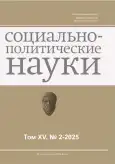Двойственность милитаризации Японии: стратегический выбор и дилеммы региональной безопасности в рамках американо-японского альянса
- Авторы: Чжан Ш.1
-
Учреждения:
- Уральский федеральный университет имени первого президента России Б.Н. Ельцина
- Выпуск: Том 15, № 2 (2025)
- Страницы: 121-126
- Раздел: Международные отношения, глобальные и региональные исследования
- URL: https://journal-vniispk.ru/2223-0092/article/view/296088
- DOI: https://doi.org/10.33693/2223-0092-2025-15-2-121-126
- EDN: https://elibrary.ru/NQVLIJ
- ID: 296088
Цитировать
Аннотация
Процесс послевоенной милитаризации Японии в рамках американо-японского альянса продемонстрировал удивительную «двойственность»: она выступала в качестве «передового агента» Индо-Тихоокеанской стратегии США и в то же время пыталась добиться стратегической независимости путем технологической автономии и многосторонней дипломатии. Принимая за отправную точку ст. 9 Конституции Японии и американо-японский договор о безопасности, в данной статье анализируются правовые противоречия, внутренние и внешние факторы милитаризации Японии и ее влияние на ландшафт безопасности в Северо-Восточной Азии. В работе отмечается, что милитаризация Японии обусловлена сочетанием внутренних политических стимулов правого толка, поддержки экономическими ресурсами и стратегическими потребностями США, проявлениями которых являются развертывание наступательных вооружений и углубление американо-японской военной синергии. Однако этот процесс усугубил китайско-японскую конфронтацию, дефицит доверия между Японией и Южной Кореей и региональную гонку вооружений, поставив Японию перед двойной дилеммой – зависимость от США и стремление к автономии. Данная статья сочетает исторический анализ и политические исследования, чтобы выявить структурные противоречия милитаризации Японии, обеспечивая новые перспективы для понимания эволюции американо-японского альянса, китайско-японских отношений безопасности и порядка в Северо-Восточной Азии.
Полный текст
Открыть статью на сайте журналаОб авторах
Шэнкунь Чжан
Уральский федеральный университет имени первого президента России Б.Н. Ельцина
Автор, ответственный за переписку.
Email: qaz809401669@gmail.com
ORCID iD: 0000-0003-2495-3431
SPIN-код: 2442-5117
аспирант, кафедра теории и истории международных отношений
Россия, г. ЕкатеринбургСписок литературы
- Dower J.W. Embracing defeat: Japan in the wake of World War II. New York: W.W. Norton & Company, 1999. 567 р.
- Стрельцов Д.В. Память о войне как самостоятельный фактор в отношениях Японии со странами-соседями: к 75-летней годовщине капитуляции Японии // Японские исследования. 2020. № 4. С. 78–97. doi: 10.24411/2500-2872-2020-10029.
- Феклова Т.Ю. Забытый фронт: II мировая война через призму школьных учебников Китая // Историческая миссия России в условиях международных кризисов и вызовов. СПб.: Санкт-Петербургский гос. экон. ун-т, 2023. С. 121–129.
Дополнительные файлы








